Kultiveret kød omformer, hvordan vi producerer og forbruger protein ved at dyrke ægte kød fra dyreceller i kontrollerede miljøer. Denne tilgang reducerer produktionstiden, sænker omkostningerne og minimerer skader på dyr. Startups inden for dette område gør imponerende fremskridt, hvoraf nogle opnår regulatoriske godkendelser, og andre reducerer produktionsomkostningerne betydeligt. Her er et hurtigt kig på 10 nøglespillere:
- Meatable: Producerer kultiveret svinekød og oksekød på kun fire dage ved hjælp af avanceret celleteknologi.
- Upside Foods: Fokuserer på kultiveret kylling med FDA og USDA godkendelser til kommercielt salg i USA.
- GOOD Meat (Eat Just): Bruger serumfrit vækstmedie til at skabe kultiveret kylling og hybride produkter.
- Steakholder Foods: Udnytter 3D bioprinting til at fremstille strukturerede kødudskæringer, herunder oksekød og svinekød.
- Gourmey: Specialiserer sig i dyrket foie gras med lave produktionsomkostninger.
- Clever Carnivore: Udvikler hele udskæringer af oksekødsprodukter og planlægger at udvide til andre kødtyper.
- Orbillion Bio: Producerer eksotiske kødtyper som bison og elg med effektive, ikke-GMO metoder.
- Aleph Farms: Fokuserer på premium hele udskæringer af oksekød, der er dyrket fra kvægceller.
- Believer Meats: Prioriterer skalerbar kyllingeproduktion med højtydende cellelinjer.
- Mosa Meat: Kendt for sin dyrkede oksekødsburger, nu udvider til andre oksekødsprodukter.
Disse virksomheder adresserer udfordringer som skalering af produktion, overholdelse af regler og forbrugeruddannelse, hvilket baner vejen for, at kultiveret kød bliver mere tilgængeligt.
1. Meatable
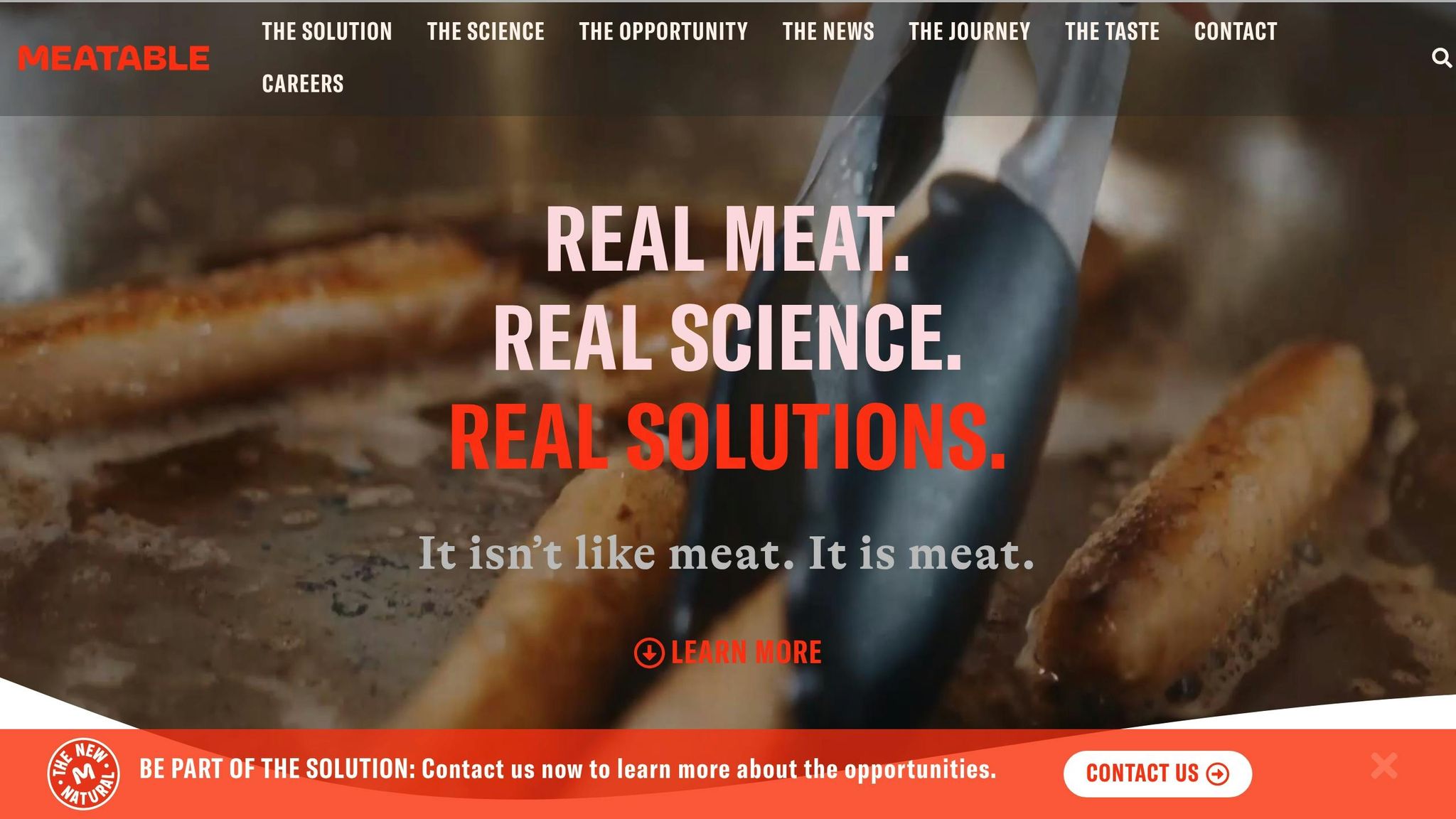
Meatable er blevet en frontløber i industrien for kultiveret kød, og gør imponerende fremskridt fra sin base i Holland. Virksomheden omformer, hvordan kød produceres ved drastisk at reducere produktionstider, og adskiller sig gennem effektivitet og innovation.
Teknologi og Metoder
I hjertet af Meatables fremskridt ligger deres proprietære Opti-Ox teknologi, som halverer celledifferentieringstiden. I samarbejde med Nutreco har virksomheden også reduceret forberedelsen af cellefoder fra flere dage til blot 30 minutter ved at bruge fødevarekvalitetsingredienser.Co-founder og CTO Daan Luining fremhævede denne præstation og sagde:
"Dette er virkelig et bemærkelsesværdigt øjeblik for Meatable og den kultiverede kødindustri som helhed, da vi netop har gjort den hurtigste proces i branchen endnu hurtigere." [1]
Produktudvalg
Meatables fokus på at udvikle et forskelligt produktudvalg har ført til skabelsen af kultiveret svinekødpølse og oksekødsprodukter. Deres kultiveret svinekødpølse blev præsenteret ved smagsprøver i Singapore og vil være i centrum for London National Science Museum's udstilling den 24. juli 2025.
Produktionseffektivitet og skala
Disse teknologiske fremskridt har betydeligt forbedret produktionseffektiviteten og skalerbarheden. Ved at reducere celledifferentieringstiden fra otte dage til fire har Meatable halveret sine bioreaktorkrav, hvilket fører til lavere produktionsomkostninger.For at udvide sin rækkevidde globalt, vedtager virksomheden en aktiv-let, licensbaseret forretningsmodel.
Ved Verdensudstillingen 2025 i Osaka, Japan, præsenterede Meatable sit dyrkede kød i den hollandske pavilions "Common Ground". I refleksion over denne milepæl bemærkede grundlægger og Chief Innovation Officer Daan Luining:
"Det føles som om vi står på skuldrene af giganter og bringer ægte, bæredygtigt kød til verdensscenen, ligesom tidligere pionerer gjorde med deres gennembrud. Vi er klar til at vise, hvordan vores teknologi kan ændre verden til det bedre." [2]
2. Upside Foods
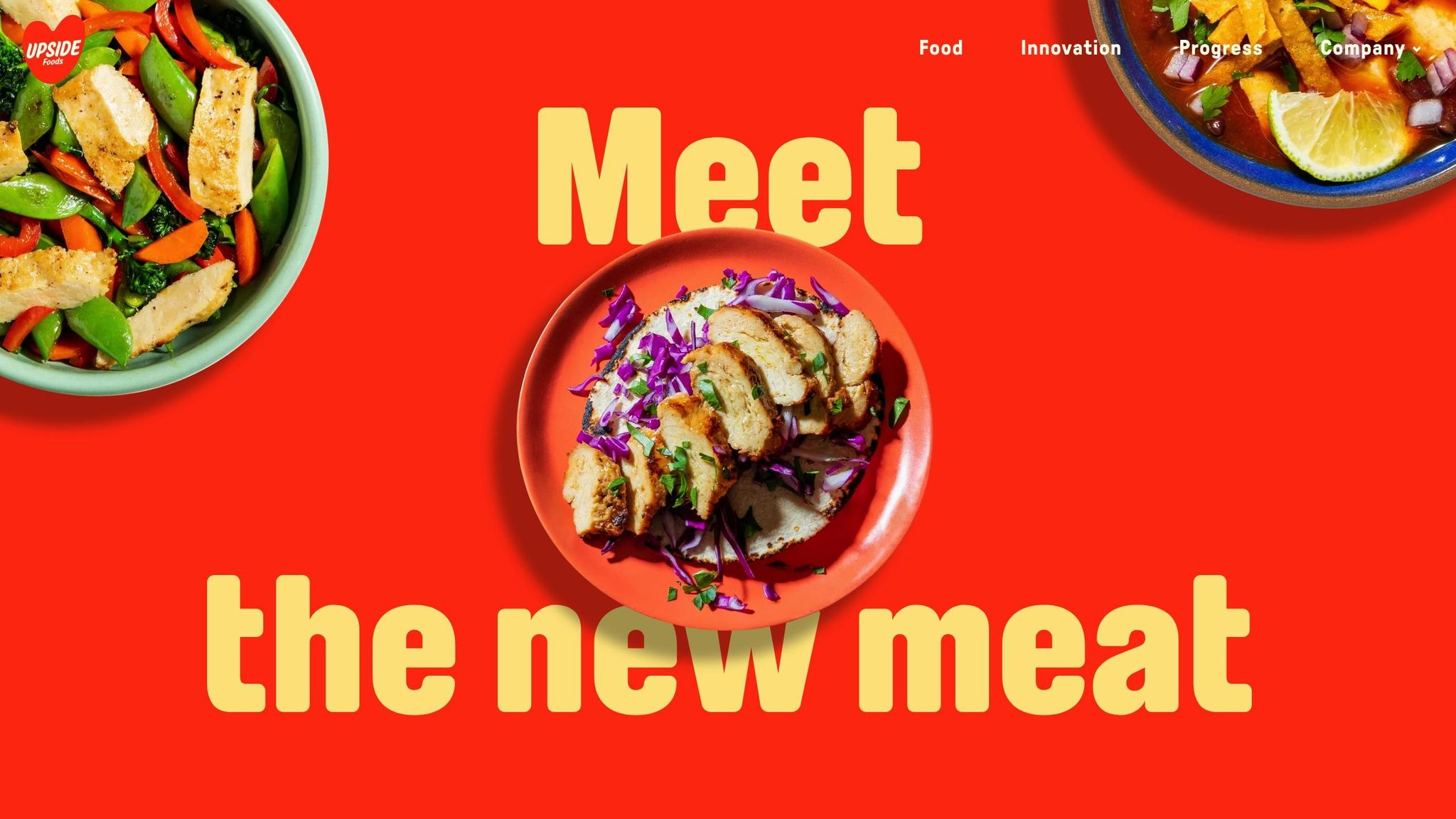
Upside Foods står som en banebryder i verden af amerikansk dyrket kød, og har opnået store regulatoriske godkendelser, der placerer det i fronten af denne fremvoksende industri.Hovedkontoret ligger i Californien, og virksomheden er udviklet fra en forskningsdrevet initiativ til en markedsparat operation, der bringer kultiverede kødprodukter tættere på forbrugerne. Dens engagement i innovation har banet vejen for betydelige fremskridt inden for teknologi og produktion.
Teknologi og Metoder
I hjertet af Upside Foods' operationer ligger en avanceret cellekultiveringsplatform, der er designet til at producere ægte kød uden behov for dyreslagtning. Ved at kultivere dyreceller i omhyggeligt kontrollerede bioreaktorer, replikerer virksomheden smagen, teksturen og kvaliteten af traditionelt kød. Denne metode bevarer ikke kun de naturlige egenskaber ved kød, men eliminerer også etiske og miljømæssige udfordringer knyttet til konventionel kødproduktion.
For at sikre sikkerhed og konsistens anvender virksomheden automatiserede systemer og standardiserede protokoller, hvilket skaber en skalerbar proces, der kan tilpasses flere produktionssteder.
Produktudvalg
Upside Foods har fokuseret på dyrkede kyllingeprodukter som sit indledende marked. Dets flagskibsprodukter inkluderer dyrkede kyllingestykker, der tæt ligner traditionel kylling i smag og kvalitet, hvilket gør dem til et tilgængeligt valg for forbrugerne.
Ud over disse produkter sigter virksomheden også mod det premium marked ved at udvikle high-end dyrkede kød muligheder. Disse produkter er rettet mod eksklusive restauranter og kræsne kunder, hvilket hjælper med at opbygge tillid og fortrolighed med dyrket kød teknologi.
Fremskridt mod Markedsintroduktion
En vigtig milepæl for Upside Foods var at blive en af de første virksomheder, der fik godkendelse fra både den amerikanske Food and Drug Administration (FDA) og det amerikanske Department of Agriculture (USDA) til kommercielt salg af dyrket kød.Denne præstation afspejler års strenge sikkerhedsvurderinger og overholdelse af regler.
Virksomheden har allerede indledt begrænsede kommercielle salg, i samarbejde med udvalgte restauranter og fødevareleverandører. Disse tidlige lanceringer introducerer ikke kun forbrugerne for kultiveret kød, men giver også værdifuld indsigt i markedsaccept og driftspræstation.
Produktionseffektivitet og skala
For at støtte sine ambitioner har Upside Foods bygget en topmoderne produktionsfacilitet i Californien. Udstyret med avancerede bioreaktorer og automatiserede systemer demonstrerer denne facilitet virksomhedens evne til at producere kultiveret kød i kommerciel skala, samtidig med at arbejdsomkostningerne holdes i skak og kvaliteten sikres.
Virksomheden fokuserer også på at reducere produktionsomkostningerne gennem procesforbedringer og strategiske samarbejder.Dens vækststrategi inkluderer at udvide eksisterende faciliteter og danne partnerskaber for at accelerere sin rækkevidde på tværs af forskellige regioner og produktkategorier, hvilket lægger grunden til en bredere markedsindtrængen.
3. GOOD Meat (Eat Just)
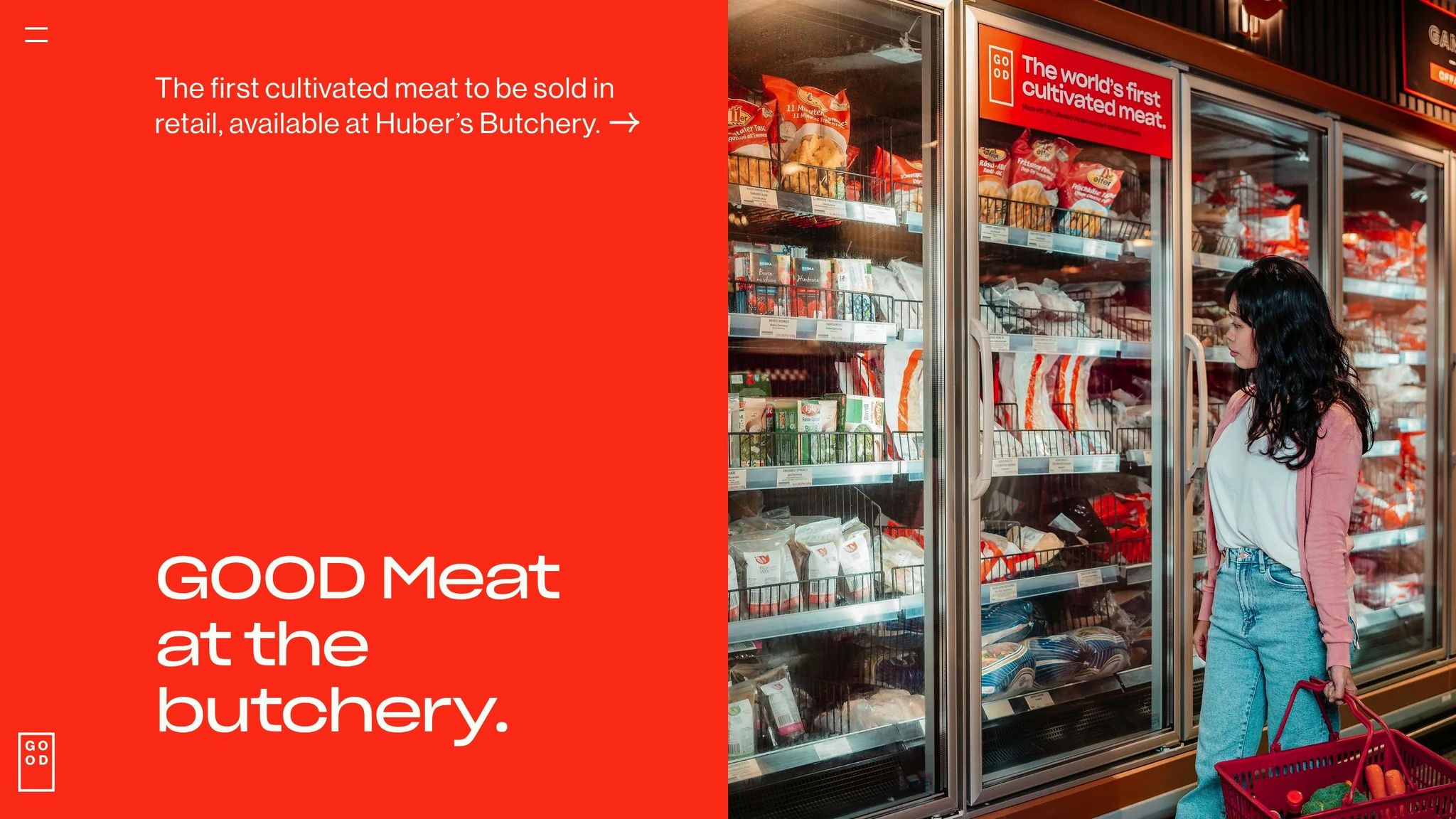
GOOD Meat, en afdeling af Eat Just, fokuserer på at skabe kultiveret kød ved hjælp af banebrydende cellulær landbrug teknikker.
Teknologi og Metoder
Processen begynder med omhyggeligt at vælge topkvalitets dyreceller. Derfra bruger GOOD Meat serumfri vækstmedier, undgår alle animalske ingredienser og er afhængig af avanceret bioreaktortechnologi til at dyrke kødet. Denne tilgang fremhæver GOOD Meats bidrag til at omforme den kultiverede kødindustri i 2025.
4.Steakholder Foods
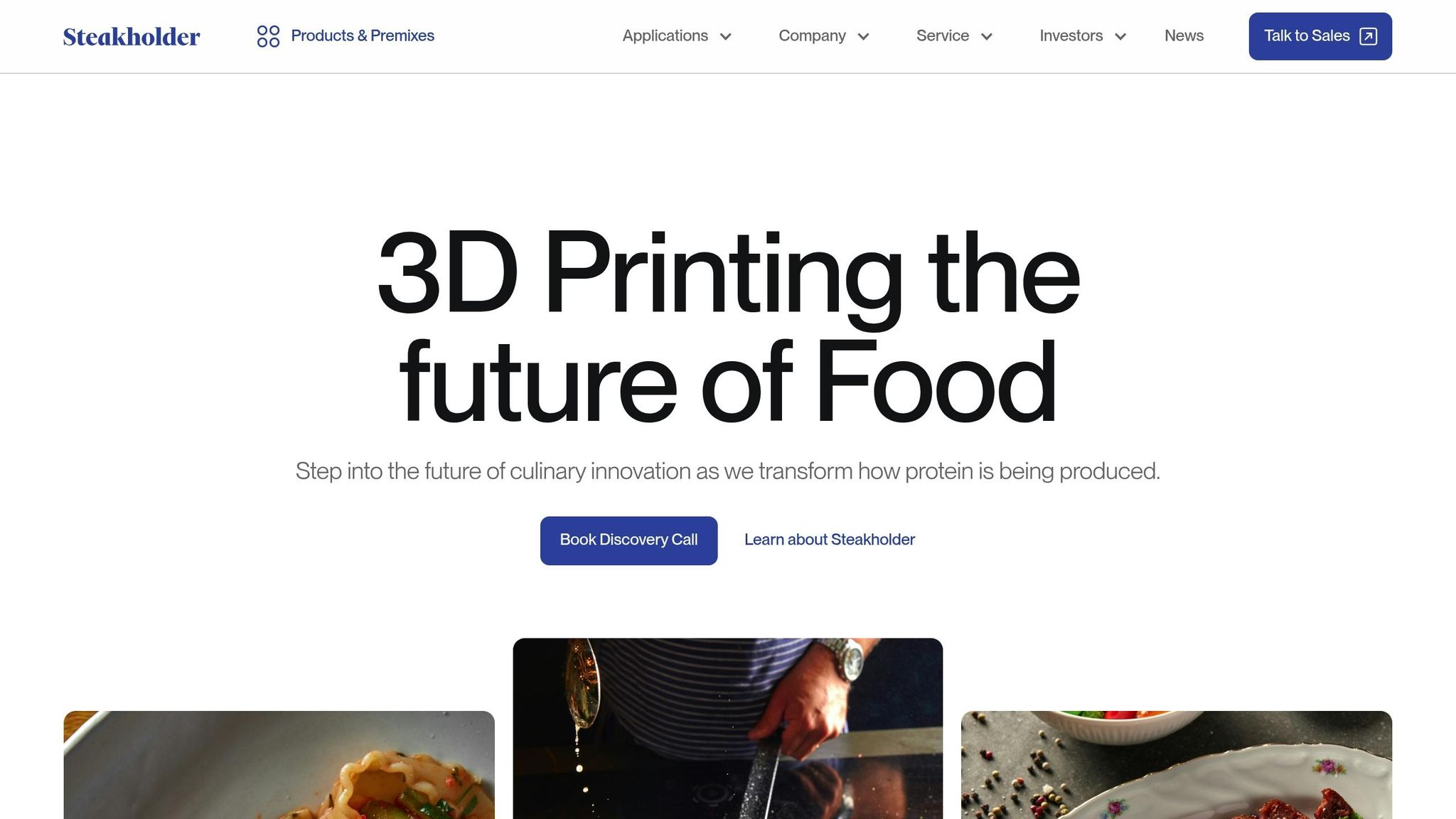
Steakholder Foods skaber bølger i den dyrkede kødindustri ved at kombinere banebrydende teknologi med et bredt fokus på produktvariation. Deres tilgang går ud over det grundlæggende og sigter mod at levere et bredt udvalg af proteinmuligheder, der tæt ligner traditionelt kød i smag, tekstur og udseende.
Teknologi og Metoder
Kernen i Steakholder Foods' innovation er 3D bioprinting teknologi, som gør det muligt for dem at fremstille strukturerede kødprodukter med imponerende præcision. Denne teknik gør det muligt for dem at kontrollere detaljer som muskel-til-fedtforhold og endda formen på det endelige produkt, hvilket efterligner de komplekse teksturer af konventionelle kødudskæringer.I modsætning til virksomheder, der primært fokuserer på kødprodukter eller hakket kød, arbejder Steakholder Foods med flere dyrecellelinjer, hvilket giver dem fleksibiliteten til at skabe et bredt udvalg af kødalternativer, der skiller sig ud for deres autenticitet.
Produktudvalg
Virksomhedens produktlinje er imponerende forskelligartet og dækker oksekød, kylling, svinekød, fisk og skaldyr. Deres udviklingsindsats spænder over alt fra råmaterialer som biomasse og hakkede produkter til strukturerede hele udskæringer. I 2023 udvidede Steakholder Foods til kultiveret svinekød, herunder produkter som bacon, svinekoteletter og skinke. De begyndte også at fokusere på kultiveret kyllingefedt, som kan integreres i plantebaserede produkter for at forbedre smag og tekstur. Et andet nøgleområde for virksomheden er hybride madapplikationer, såsom kødboller, der kombinerer kultiverede dyreceller med plantebaserede ingredienser for et unikt og alsidigt tilbud.
Produktionseffektivitet og skala
I november 2023 opnåede Steakholder Foods en betydelig milepæl ved at reducere omkostningerne til in-house vækstmedier for bovine celler med 75%. Denne omkostningsreduktion åbner døren for mere overkommelige hybridprodukter, som blander dyrkede celler med plantebaserede materialer. Denne tilgang hjælper ikke kun med at sænke produktionsomkostningerne, men tilbyder også forbedrede miljømæssige fordele sammenlignet med fuldt dyrkede produkter, hvilket gør det til en praktisk og bæredygtig vej til markedsindtræden[3].
5. Gourmey

Gourmey har skabt sig en niche i den dyrkede kødindustri ved at specialisere sig i premium fjerkræprodukter, med særlig vægt på dyrket foie gras.Denne franske startup har fået opmærksomhed ikke kun for sine unikke tilbud, men også for at opnå bemærkelsesværdigt lave produktionsomkostninger, mens de leverer høj-kvalitets kulinariske oplevelser.
Teknologi og Metoder
Gourmey anvender banebrydende teknikker til at forfine sine produktionsprocesser. En nøgleinnovation er brugen af en digital tvilling af fugle, udviklet i samarbejde med DeepLife, som hjælper med at optimere hver fase af produktionen [4]. Virksomheden anvender proprietære embryonale stamceller, der selvfornyer uden behov for genetisk modificering. Denne tilgang eliminerer behovet for dyre vækstfaktorer, hvilket gør deres produktion mere omkostningseffektiv [5].I modsætning til konkurrenter, der er afhængige af biopharma-gradede systemer, har Gourmey vedtaget fødevaregradede processer, hvilket yderligere reducerer omkostningerne og forbedrer skalerbarheden [5][6].
Produktudvalg
Virksomhedens flagskibsprodukt er kultiveret foie gras, skabt af ande- og gåselever. Dette valg afspejler et strategisk fokus på premium-markedet, hvor autenticitet og kvalitet værdsættes højt [6]. Udover foie gras har Gourmey planer om at udvide sit sortiment og udforske yderligere fjerkræproteiner og andre typer kød i fremtiden. Kulinariske eksperter har rost produktet for dets farve og tekstur, hvilket gør det til et fremtrædende valg i fine dining-sektoren [6].
Produktionseffektivitet og Skala
Gourmey har opnået en produktionsomkostning på €7 pr. kilogram - i øjeblikket den laveste omkostning verificeret af tredjeparter.Dets foderomkostninger er så lave som €0,20 pr. liter, og virksomheden bruger 5.000-liters bioreaktorer (seks pr. anlæg) til at producere over 1.700 ton årligt. Imponerende nok forventes kapitaludgifterne for hvert anlæg at forblive under €35 millioner [5][6].
Fremskridt mod markedsintroduktion
Med over €65 millioner i finansiering og mere end 50 patenter til sit navn er Gourmey godt positioneret til en kommerciel lancering. Virksomheden har allerede overskredet tidlige produktionsprognoser, hvilket signalerer stærk momentum, da den nærmer sig at bringe sine produkter på markedet [6].
6. Clever Carnivore
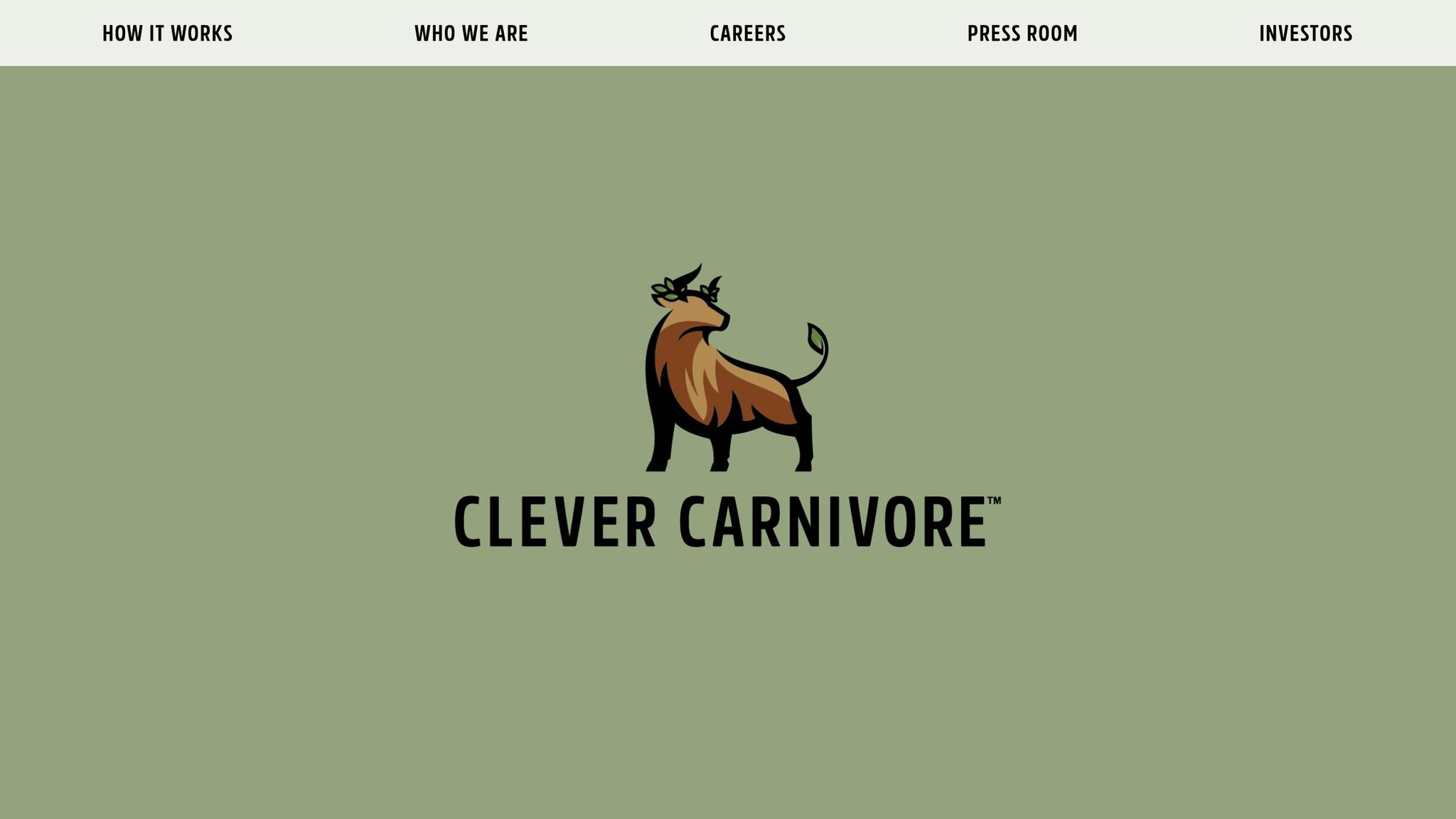
Clever Carnivore, en dyrket kød startup baseret i Storbritannien, er dedikeret til at skabe hele udskæringer af oksekød, der efterligner teksturen og spiseoplevelsen af traditionelle udskæringer.Deres mål er at levere de samme høje kvalitetsstandarder, som forbrugerne forventer fra konventionelt kød. Mens de fortsætter med at finjustere deres produktionsteknikker, forbereder virksomheden sig også på at udvide til andre typer kød, hvilket baner vejen for en bredere markedsintroduktion.
sbb-itb-c323ed3
7. Orbillion Bio
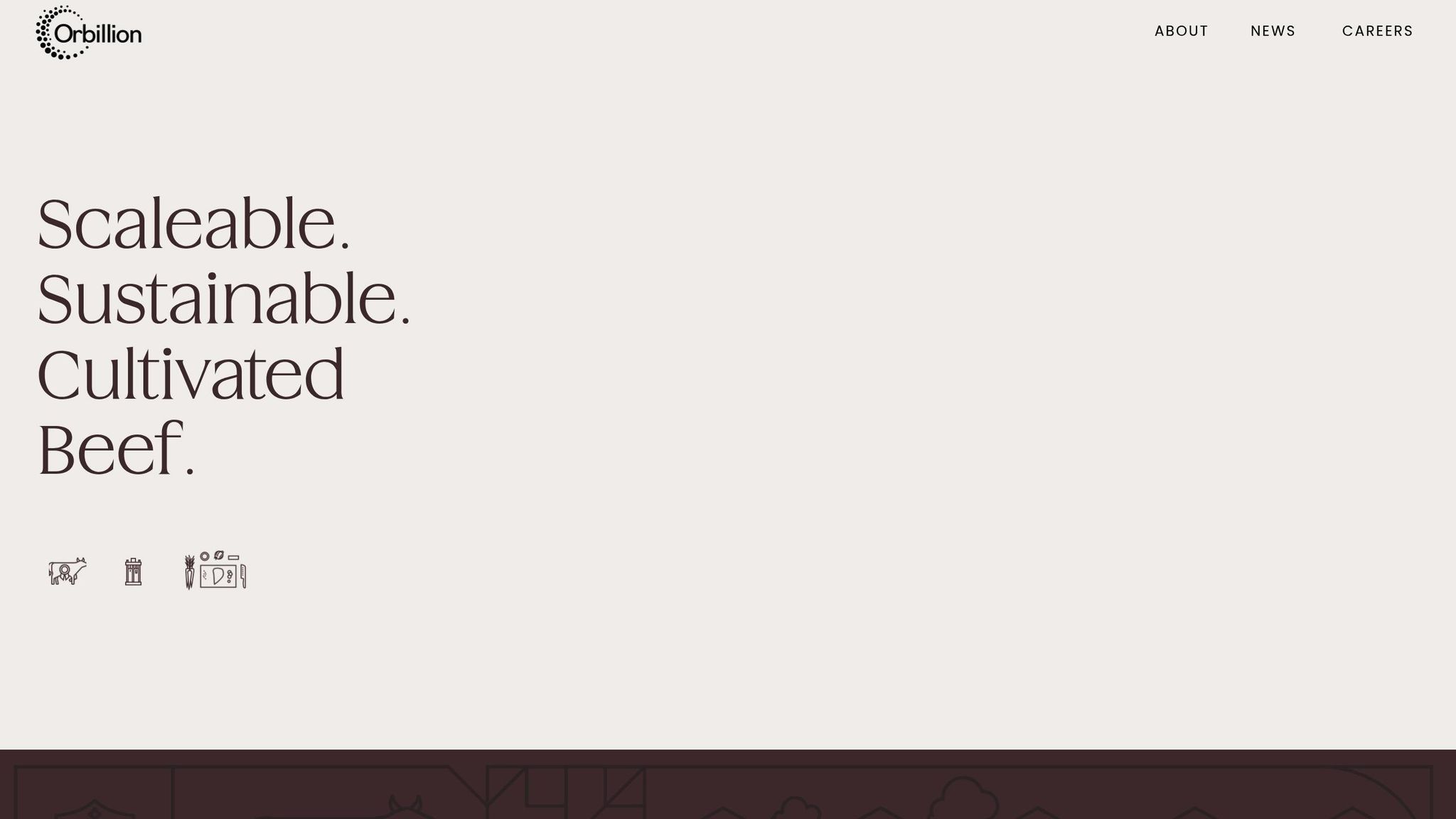
Orbillion Bio har skabt en niche i den dyrkede kødindustri med sin banebrydende tilgang, der undgår genetisk modificering, samtidig med at den opnår imponerende produktionseffektivitet. Ved at bruge en proprietær metode skalerer virksomheden muskel- og fedtceller fra en biopsi for at skabe ægte dyrket kød, alt sammen uden at være afhængig af kostbare vækstfaktorer.
Teknologi og Metoder
I hjertet af Orbillons innovation ligger deres bioware teknologi, en game-changer inden for cellulær landbrug.I modsætning til traditionelle teknikker dyrker Orbillion celler i tredimensionel suspension i stedet for på flade overflader. Denne tilgang øger betydeligt celledensiteten og udbyttet [10].
Deres avancerede beregningsmodeller finjusterer kulturforholdene, hvilket muliggør effektiv storskala produktion. Et centralt element i deres teknologi er en prædiktiv modelleringsplatform, kendt som scale-up algorithm, som nøjagtigt simulerer kritiske medie- og bioprocessparametre. Dette muliggør en hurtig overgang af pattedyrscellekulturer fra 2D til 3D-miljøer, hvilket fremskynder processen som aldrig før [8][10].
"Denne præstation er revolutionerende - ikke kun for Orbillion, men for fremtiden for mad.Direkte skalering af oksekøds muskel- og fedtceller - de grundlæggende byggesten i kød - uden GMO, serum eller dyre vækstfaktorer, gør det muligt for os at levere det mest velsmagende, bæredygtige og omkostningseffektive kultiverede kød, verden nogensinde har set." – Dr. Samet Yildirim, Chief Technology Officer, Orbillion Bio [8]
Effektivitet og Skalering
Orbillion's teknologi reducerer produktionstiden til kun 10% af branchestandarden og sparer cirka £800.000. Derudover reducerer deres aktivlette strategi kapitaludgifterne med 40% [7][9][10].
Ved at udnytte eksisterende infrastruktur undgår virksomheden behovet for kostbart, specialbygget udstyr, hvilket yderligere reducerer omkostningerne og strømliner vejen til kommercialisering [7][10].
Fremskridt mod markedsintroduktion
I september 2023 opnåede Orbillion en betydelig milepæl med en vellykket 200-liters opskalering, der producerede over 4 millioner pund kultiveret kød årligt [10].
"Med vores bioware og beregningsplatform for kultiveret kød kan vi opskalere på en brøkdel af tiden. Vores 200-liters kørsel viser, at vi kan opnå på få uger, hvad der tager de fleste virksomheder et helt år." – Samet Yildirim, COO, Orbillion Bio [10]
Grundlæggerne af Orbillion bringer omfattende erfaring fra den biopharma-sektor, som de har tilpasset til fødevareproduktion for at optimere processer og reducere omkostninger [8].Deres højtydende cellekulturplatform er designet til at nå prisparitet med traditionelt oksekød, hvilket positionerer virksomheden som en stærk konkurrent i kapløbet om at bringe kultiveret kød til markedet [9].
8. Aleph Farms
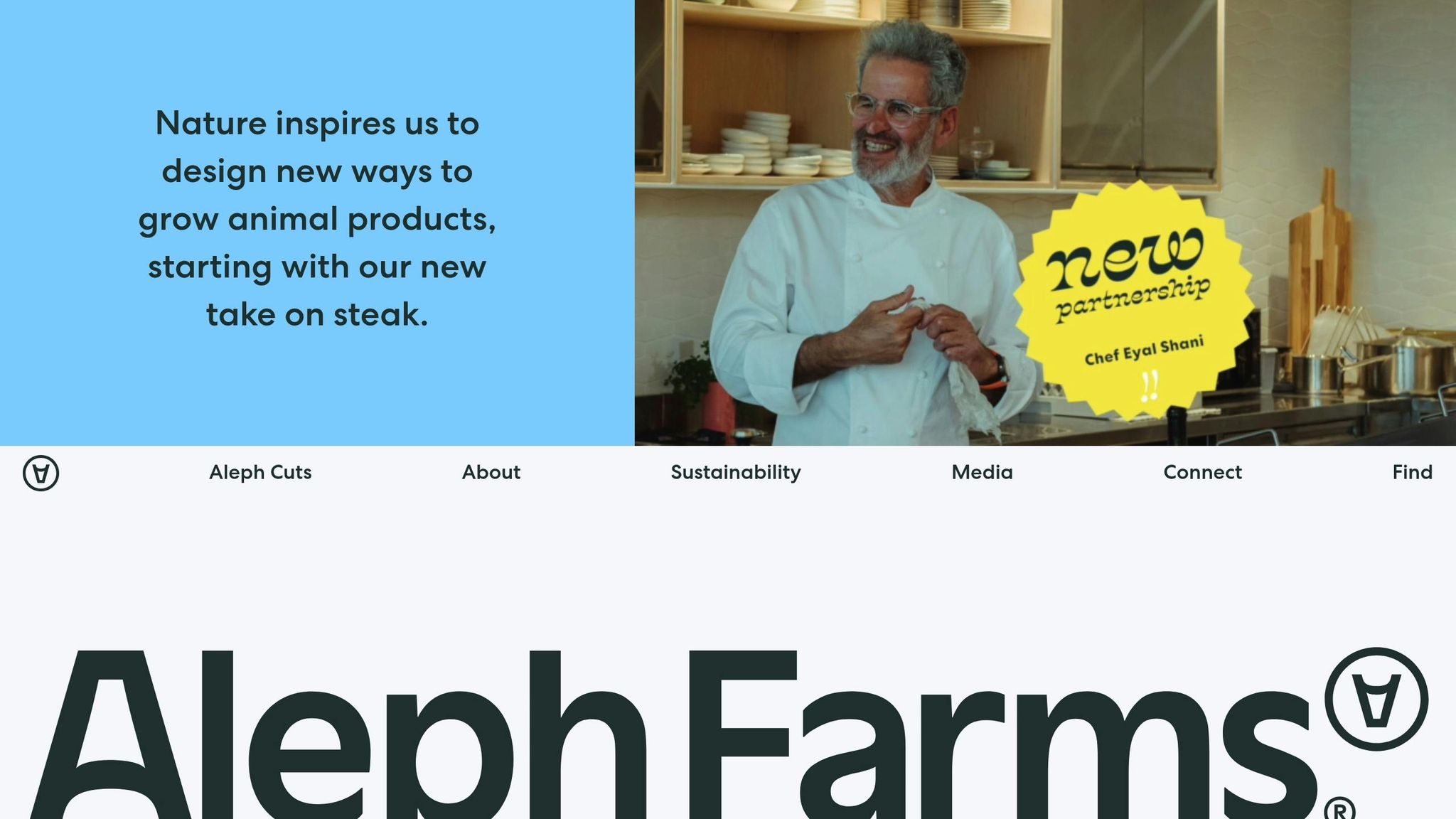
Aleph Farms, en israelsk startup, skaber bølger i den kultiverede kødindustri ved at fokusere på hele udskæringer af oksekød. Deres mission? At genskabe teksturen og smagen af konventionelt oksekød så tæt som muligt ved hjælp af banebrydende teknologi til at dyrke kød direkte fra ko-celler.
Det, der adskiller Aleph Farms, er deres fokus på autenticitet. I stedet for kun at sigte mod at skære omkostninger, prioriterer de at fange de komplekse detaljer, der gør oksekød så tiltalende - som dets marmorerede fedt og fibrede tekstur. For at opnå dette bruger de tredimensionel vævsteknologi til at dyrke komplekse muskelstrukturer.Resultatet er en bøf, der ikke kun ser ud, men også smager og føles som traditionelle oksekødsudskæringer, hvilket leverer den premium kvalitet, som forbrugerne forventer.
9. Believer Meats
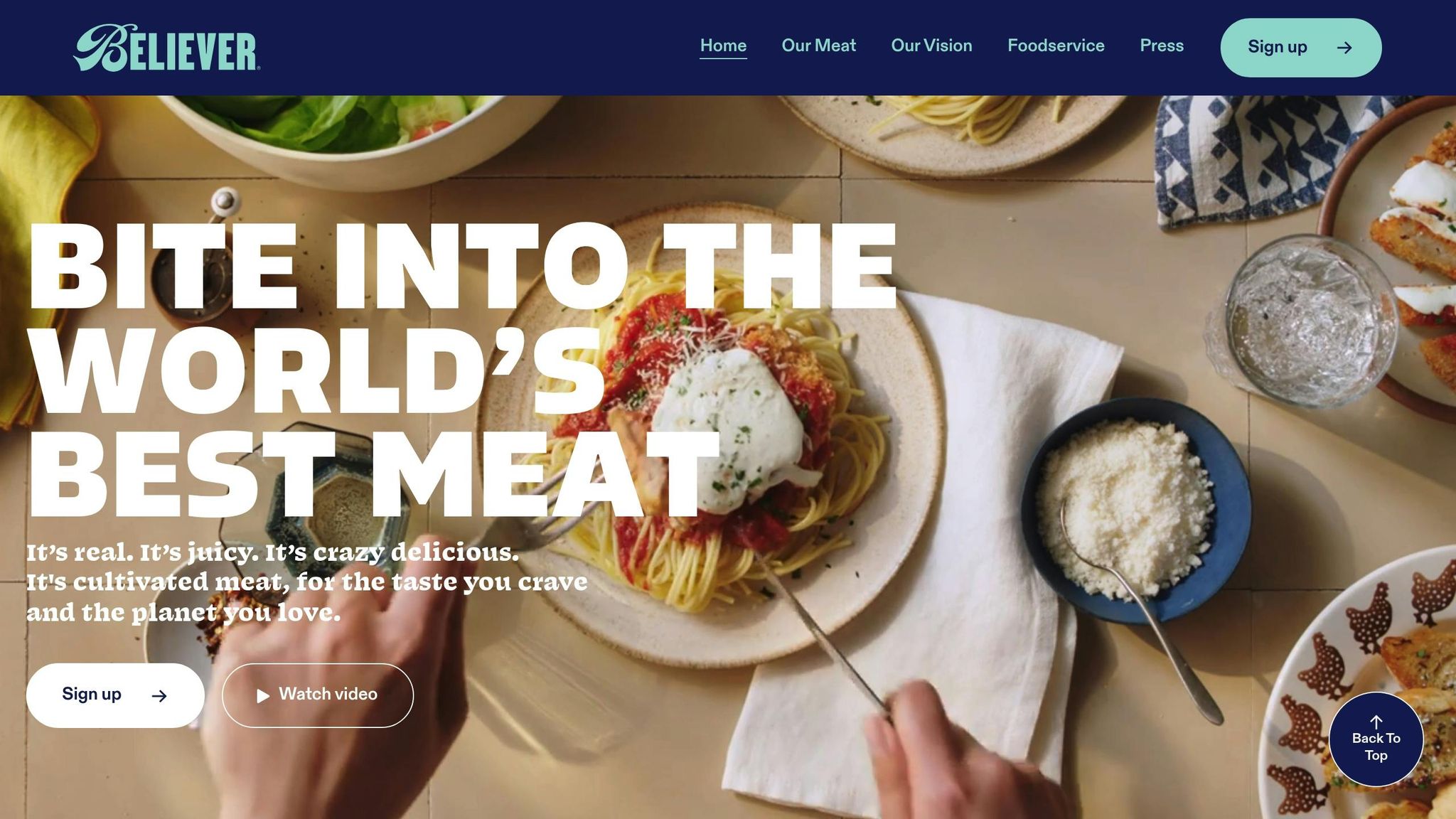
Believer Meats er i front for produktion af kultiveret kød, med det mål at skabe et skalerbart alternativ til traditionelt landbrug. Denne israelske startup har udviklet en unik tilgang til at dyrke kød fra celler, med fokus på systemer, der kan matche konventionelt landbrug både i omkostninger og skala.
Teknologi og Metoder
Nøglen til Believer Meats' succes ligger i deres innovative udvikling af cellelinjer. I modsætning til konkurrenter, der gentagne gange skaffer nye dyreceller, tager virksomheden en engangs tilgang, der skaber uendeligt prolifererende cellelinjer uden at være afhængig af genetiske modifikationer.
"Vores linjer af dyreceller kan vokse for evigt uden behov for genetiske modifikationer." – Believer Meats [12]
Denne metode forenkler ikke kun produktionsprocessen, men reducerer også omkostningerne og adresserer etiske bekymringer knyttet til gentagen høst af dyreceller. Deres system opnår udbytter, der er ti gange højere end nuværende industrielle standarder, hvilket giver et betydeligt fremskridt i effektivitet. Denne gennembrud gør det muligt for dem at fokusere på en enkelt produktkategori, hvilket sikrer en strømlinet og effektiv produktionsproces.
Produktudvalg
Ved at udnytte denne teknologi har Believer Meats valgt at koncentrere sig om kultiveret kylling, hvilket er i overensstemmelse med den globale efterspørgsel og markedstendenser. Ved at indsnævre deres fokus sigter virksomheden mod at opnå omkostningseffektivitet og etablere sig som en leder på dette område."I 2024 blev deres bestræbelser på at forme fremtiden for produceret kylling anerkendt bredt, hvilket fremhæver deres engagement i dette specifikke protein frem for at diversificere ind i andre kødtyper.
Fremskridt mod markedsintroduktion
Believer Meats har også prioriteret gennemsigtighed i sin forskning. Virksomheden har offentliggjort, hvad eksperter har kaldt "den mest omfattende undersøgelse af produceret kød, der er offentliggjort til dato", hvilket sætter nye standarder for branchen [11]. Ved åbent at dele produktionsdata hjælper de med at etablere benchmarks, der kan vejlede den bredere sektor for produceret kød.
Produktionseffektivitet og skala
Virksomhedens strategi drejer sig om at opnå prisparitet med konventionelt kød. Deres produktionssystem er designet til høje udbytter og effektivitet, med det ultimative mål at producere kød til eller under omkostningerne ved traditionelle landbrugsmetoder.
Det, der adskiller Believer Meats, er fokus på skalerbar infrastruktur frem for udelukkende produktudvikling. Ved at tackle udfordringer som cellelinjestabilitet og produktionseffektivitet lægger virksomheden fundamentet for storskala kommercielle operationer og positionerer sig som en leder på markedet for kultiveret kød.
10. Mosa Meat
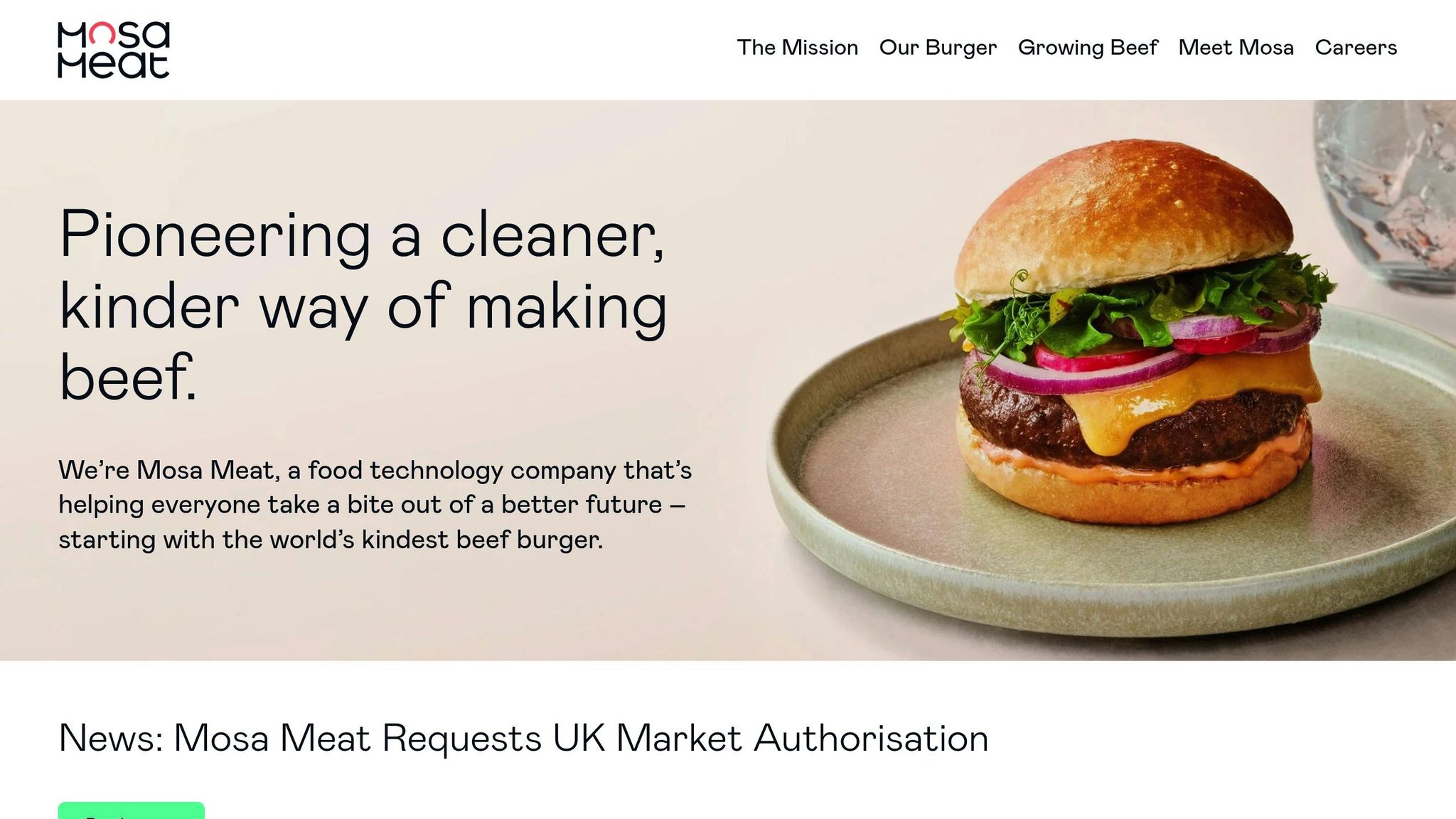
Mosa Meat er en banebryder inden for sektoren for kultiveret kød, bedst kendt for at have skabt en af verdens første laboratorie-dyrkede okseburger. Grundlagt i 2013 af Dr. Mark Post i Holland, har virksomheden været afgørende for at forfine den teknologi, der er nødvendig for storskala produktion af kultiveret kød. Tro mod sine rødder fortsætter Mosa Meat med at presse grænserne inden for cellekulturinnovation og opskalering af produktionen.
Teknologi og Metoder
Mosa Meat har fokuseret på at udvikle stabile cellekulturer og skalerbare produktionsmetoder. Processen centrerer sig om at dyrke muskelceller på en måde, der afspejler egenskaberne ved traditionelt oksekød, samtidig med at brugen af animalske vækstkomponenter reduceres. Denne tilgang har til formål at producere kød, der både er bæredygtigt og ikke kan skelnes fra konventionelt oksekød.
Produktudvalg
Efter at have introduceret sin banebrydende dyrkede oksekødsburger, udvider Mosa Meat nu sit portefølje. Virksomheden arbejder på andre oksekødsprodukter, der efterligner teksturen og marmoreringen af traditionelle udskæringer, med det mål at tilbyde et varieret udvalg af muligheder for forbrugerne.
Fremskridt mod Markedsintroduktion
Teamet hos Mosa Meat gør fremskridt i at skalere produktionen og navigere i regulatoriske godkendelser, hvilket bringer dem tættere på at lancere deres produkter kommercielt.
Produktionseffektivitet og skala
For at imødekomme markedets efterspørgsel fokuserer Mosa Meat på at automatisere og standardisere sine processer. Dette sikrer produktionen af højkvalitets kultiveret oksekød samtidig med at omkostningerne holdes konkurrencedygtige, hvilket baner vejen for bredere adoption.
Virksomhedssammenligningstabel
Her er et hurtigt overblik over produktfokus for forskellige startups i den kultiverede kødindustri. Denne tabel fremhæver udbuddet, fra hverdagens proteiner til mere specialiserede muligheder, og viser variationen inden for sektoren.
| Virksomhed | Primært produktfokus |
|---|---|
| Meatable | Dyrket svinekød og oksekød, med teknologi tilpasselig til arter som køer, får og fisk |
| Upside Foods | Dyrket kylling, oksekødsfrikadeller og and |
| GOOD Meat (Eat Just) | Dyrket kylling og hybride produkter, der kombinerer dyrket kød med plantebaserede komponenter |
| Steakholder Foods | Premium hele kødudskæringer, herunder bøffer |
| Gourmey | Dyrket foie gras lavet af fugleceller |
| Clever Carnivore | Hele udskæringer af dyrket oksekød |
| Orbillion Bio | High-end dyrkede eksotiske kød, såsom bison og elg |
| Aleph Farms | Premium dyrkede oksekødssteaks, med lam, hakket kød og burgerbøffer under udvikling |
| Believer Meats | Cell-baserede produkter, herunder hamburgere, kyllingebryst og kebabkød |
| Mosa Meat | Dyrket oksekød, herunder oksefedt og burgere |
Mens nogle virksomheder fokuserer på bredt forbrugte proteiner som kylling, oksekød og svinekød, skaber andre nicher med tilbud som dyrket foie gras eller eksotiske kød som bison og elg.
Konklusion
De ti dyrkede kød startups fremhævet i denne artikel forvandler den måde, vi tænker på kødproduktion. Hver virksomhed bringer sin egen tilgang til bordet, fra Meatable's hastighedsfokuserede produktionsmetoder til Gourmey's eksklusive dyrkede foie gras. Mens nogle koncentrerer sig om velkendte proteiner som kylling for at fremme forbrugeraccept, tør andre at producere eksotiske kødtyper og premium udskæringer, som traditionelle metoder aldrig kunne opnå.
Disse fremskridt omformer ikke kun det globale fødevarelandskab - de præsenterer også spændende muligheder for Storbritannien. Med sin blomstrende fødevareteknologiindustri og voksende interesse for bæredygtige muligheder er Storbritannien godt positioneret til at blive en nøglespiller i det europæiske marked for dyrket kød, efterhånden som reglerne udvikler sig, og bevidstheden spreder sig.
Når det er sagt, er vejen fra laboratorium til middagsbord ikke uden sine forhindringer.Disse startups står over for udfordringen med at navigere i reguleringsprocesser, skalere produktionen og overbevise forbrugere, der måske er nysgerrige, men tøvende over for denne nye type mad.
Her kommer platforme som
Mens disse ti virksomheder fortsætter med at forfine deres metoder og forberede sig på kommercialisering, skaber de ikke bare nye produkter - de baner vejen for en genovervejet tilgang til kødproduktion og -forbrug.
Ofte stillede spørgsmål
Hvad er de vigtigste fordele ved kultiveret kød i forhold til traditionel kødproduktion?
Kultiveret kød bringer flere vigtige fordele sammenlignet med traditionel kødproduktion. For det første kræver det meget mindre land, vand og energi at producere, samtidig med at det genererer færre drivhusgasemissioner. Dette gør det til en langt mere bæredygtig mulighed, der kan hjælpe med at tackle miljømæssige udfordringer knyttet til konventionelt landbrug.
En anden stor fordel er, at det fjerner behovet for dyreslagtning. Dette forbedrer ikke kun dyrevelfærd, men giver også en sikrere, mere kontrolleret måde at producere mad på, med en lavere risiko for kontaminering eller sygdom. Det er et fremadskuende alternativ, der stemmer overens med voksende værdier om miljøansvar og medfølelse.
Hvordan overvinder opdrættede kød-startups regulatoriske forhindringer for at bringe deres produkter på markedet?
Opdrættede kød-startups arbejder hånd i hånd med fødevaresikkerheds- og reguleringsmyndigheder for at navigere i det komplekse landskab af godkendelser. Deres mål? At sikre, at deres produkter opfylder strenge sikkerhedsstandarder, samtidig med at de fremmer tillid blandt både regulatører og forbrugere.
For at opnå dette finjusterer disse virksomheder deres produktionsmetoder for at overholde strenge sikkerhedsprotokoller. De prioriterer også gennemsigtighed i deres processer, et væsentligt skridt i at opbygge tillid og troværdighed.
Et centralt fokusområde er udviklingen af skalerbare produktionsteknikker. Dette involverer forbedring af cellekultiveringsmetoder og sourcing af pålidelige, høj-kvalitets cellelinjer.Ved at tackle disse regulatoriske og tekniske udfordringer direkte, lægger startups grundlaget for, at kultiveret kød kan fremstå som et praktisk og tilgængeligt valg for forbrugerne, hvilket tilbyder et lovende alternativ til traditionelle kødprodukter.
Hvilke banebrydende teknologier bruger startups inden for kultiveret kød for at forbedre effektiviteten og sænke omkostningerne?
Startups inden for kultiveret kød skubber grænserne med banebrydende bioreaktorsystemer, der er designet til at forbedre cellevækst og øge produktions effektiviteten. Ved at forfine disse systemer formår de at sænke omkostningerne betydeligt. En anden stor ændring sker i valget af vækstmedier. I stedet for at stole på traditionelle muligheder som fostervæske fra kvæg, vender mange virksomheder sig nu mod plantebaserede alternativer. Disse sænker ikke kun omkostningerne, men gør også processen mere bæredygtig.
Derudover træder værktøjer som AI-drevet cellulær modellering og 3D bioprinting ind i rampelyset. Disse teknologier strømliner produktionsprocesser og gør det lettere at skalere operationer. Sammen positionerer disse fremskridt kultiveret kød som et praktisk og mere overkommeligt alternativ til traditionelt kød, hvilket baner vejen for, at det kan blive mere tilgængeligt i fremtiden.













